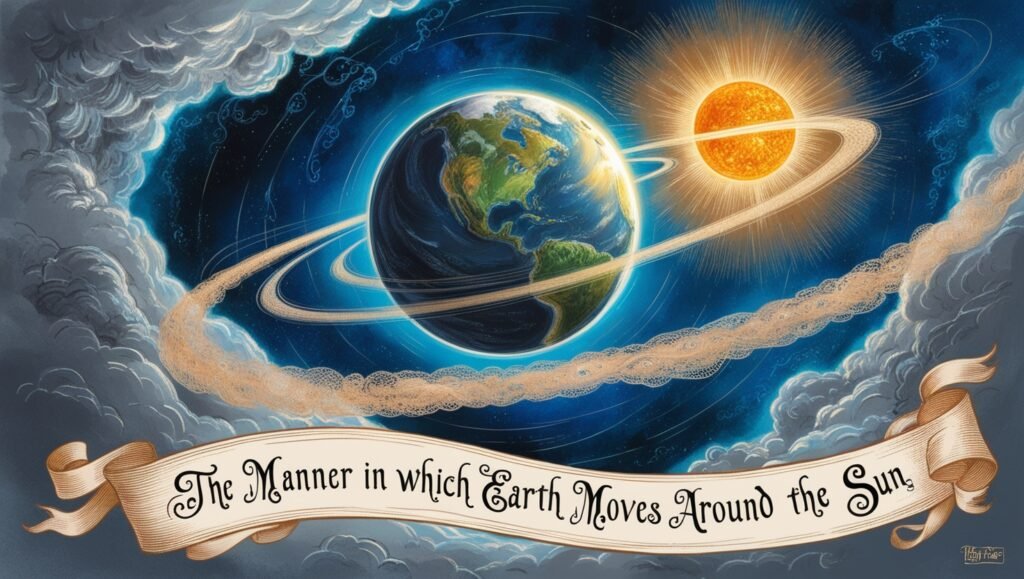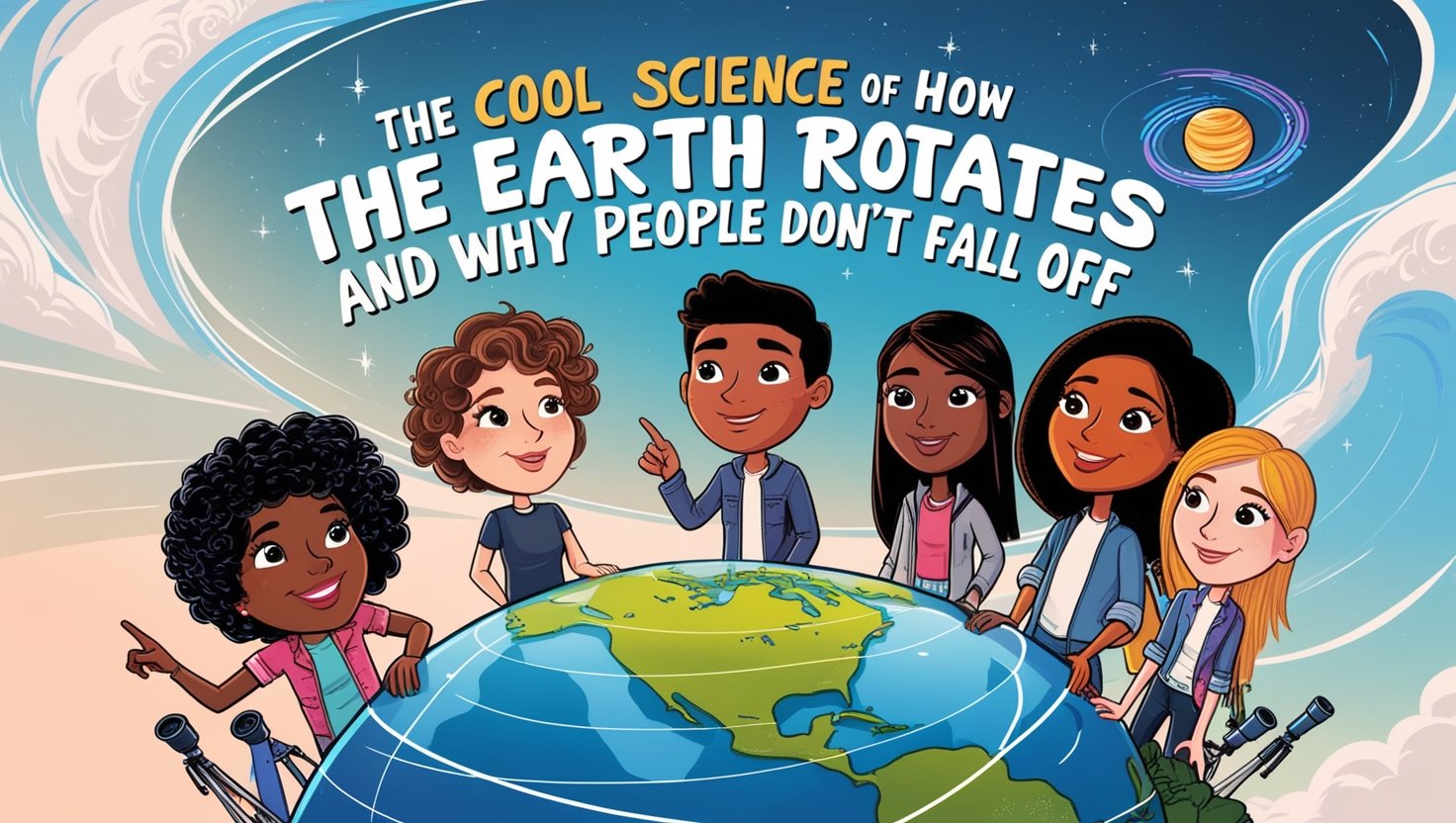Hello people! While living on Earth, there is one fundamental fact that people do not even doubt the planet rotates constantly. We do not experience this tremendous speed as it rotates on its axis, and more importantly, we do not fall off! How is it possible?
Not only does the science of Earth’s rotation sound fascinating, but it is also important for people to understand some basic physics and how the world operates. This blog will explore the science behind the rotation of the earth, explain why we can never experience the earth spinning, and explain how gravity holds us down. We will also talk about inertia, the orbit of the Earth, and how all these factors contribute to sustaining life on the planet.
Let’s explain it!
How fast does the earth spin?
Now, let us first consider the basics to explain the physical idea regarding the Earth’s rotation. The term Earth’s rotation means the way the Earth revolves around a particular line or axis. An axis is an imaginary line that runs across both the North and South poles of a geographical location. If one looks at the globe from the North Pole, the Earth rotates from left to right, and it takes approximately twenty-four hours to complete a cycle. Night and day are gifts from this rotation.
- If your region of the Earth is facing the Sun, it is midday.
- Your region of the Earth is oriented with its back towards the Sun when it is nighttime.
Rotation is one of the most crucial and continuous natural phenomena that affect life on our planet, among all other natural factors. Ah, it should be noted that the Earth rotates around the axis; the axis is the equator – at a speed of approximately 1,670 km/h (1,037 mi/h)! Still, night and day do not occur, nor do we feel the Earth’s rotation on its axis or travel into space at such a velocity. However, why?
Gravity’s Role Why We Don’t Fall Off
There is just one strong but rather simple force: gravity. That is why people do not fly off the Earth, although it rotates very fast.
The force that attracts objects towards each other is known as gravity. Because of the size of the earth, all objects are pulled to the surface of the globe through a force of gravity strong enough to contain human beings, animals, buildings, and seas. Whether you are anywhere on Earth, the force that holds you down is gravity.
This Is How It Operates
It is a force that pulls everything towards the center of the Earth. The attraction is so great that even the rotation of the Earth cannot slow it down. For this reason, everything remains where it is on the Earth, and nothing goes flying off into space.
- In its most basic form, gravity pulls you down and towards the center of the earth.
- This force is not affected by the rotation of the earth because gravity is a much stronger force.
Why The Earth Is Not In Our Hands?
This leads to the next question: “Why don’t we feel the earth moving if it is rotating at such a speed?” This is another complicated problem that many people have. Two concepts—inertia and the fact that everything around us is moving—are the answers.
- The quality of matter known as inertia keeps an object at rest or in motion until an outside force changes it.
- When the earth revolves, all objects in the world, including you, the air, the oceans, and the buildings, move along with it.
- I found that there is no jolt or signal to the body that something is in motion because everything is turning at the same slow and constant rate.
Consider yourself being on a moving train that is not very fast. You do not get dragged forward when the train is in motion at a certain speed because everything around you is moving at the same speed.
You can only experience motion when the train starts or halts suddenly. Similarly, we cannot notice the rotation of the Earth due to the fact that it is a constant process.
Relative Motion
Since we have no reference point in our daily experience by which we can either see or sense that motion, we are completely unaware that the Earth is rotating.
We do not notice
motion because all objects in the universe appear to be moving with the same velocity as ourselves: the clouds, the earth, and the air. In fact, the only time you would be able to watch the Earth rotate would be if you were an astronaut floating in space.
The Manner In Which The Earth Moves Around The Sun

- The Earth moves on its axis, changes into day and night, and also moves around the sun. This is called revolution, which changes the seasons. The time it takes the planets to go entirely a circle around their star is a year and is 365.25 days.
- That is why the calendar is increased to one day every four years. But in every circle, there is yet another quarter of a day called the leap year.
- However, the Earth is not spherical. That is, it is ‘oval-shaped; that is, it orbits the sun in an elliptical manner. The distance of the Earth to the Sun changes as the Earth orbits the star of a fixed radius called the Earth’s orbit.
- This difference is small, though, to greatly change the earth’s temperature. The planet’s axis does affect temperature and, therefore, the seasons.
The Axis of Earth’s Tilt
The axis of rotation of the earth is prepared at an angle of 23.5. It is not similar to the plane of Earth’s orbit. The seasons are as a result of this tilt. Various regions on the surface of the planet receive varying amounts of light from the sun in a particular year because of the earth’s rotation around the sun. For example,
- The Northern Hemisphere has summer, while the latter has winter; indeed, if one is tilted towards the Sun, then the other will be away from it.
- The Earth’s rotation around the sun shows seasons of change, which affect various spheres of life on the Earth, including temperature, weather, and daylight.
Centripetal Force The Symmetry Of Gravity And Rotation

Another interesting aspect of the planet’s rotation is the Earth’s ability to generate a small outward force known as the centripetal force.
- This force aims at attempting to throw objects outside the center of rotation when an object, such as a planet, rotates. An example of this is when you balance a ball on a string; if you let go of the string, the ball goes haywire.
- This outward force is due to the rotation of the Earth, and it is greatest at the equator since this is where the globe rotates at the fastest rate. However, the centripetal force is considerably smaller than the force of gravity on the Earth. Gravity and centripetal force are two forces that help to ensure that we are securely anchored. Nevertheless, with the force of rotation working on increasing the outward, there is still the force of gravity.
- The earthly sphere is, as if, rather flattened at the poles and widened towards the equator because the force of gravity balances this force. The planet’s form is an absolute sphere.
If The Earth’s Motion were stopped what would happen?
If one day, the Earth stopped moving around its axis? The results would be tragic. If it stopped rotating, the climate of the Earth, the oceans, and even the atmosphere would be changed. Here’s what could happen:
Days and Nights Would Last Six Months
If the Earth ceased to rotate, one side would always face the sun, and the other would stay in deep darkness. This would lead to the two ends of the wire being either red hot or freezing over.
The Oceans Would Shift
Continents would no longer be anchored to the oceans by the centrifugal force provided by the Earth’s rotation. In fact, water should flow to the poles, again forming new oceans and significantly shifting coasts.
The Atmosphere Would Be Affected
The atmosphere would continue to move even as the Earth came to a standstill. This would create outrageously powerful gusts of wind, sometimes exceeding hundreds of miles per hour, thus destroying all that came their way.
Earth’s Magnetic Field
The homing device known as the Earth’s rotation, the magnetic field around the Earth, shields us from damaging solar activity. If one part of the device is not rotating, then the overall magnetic field may be lost entirely, which can lead to the planet being bathed in radiation originating from space.
Luckily for us
the Earth is not going to stop rotating in the near future, despite the fact that the planet is gradually rotating slower and slower due to the force of the moon; for the next generation, for a billion years, we may barely feel this significant slight variance.
So the next time
you look up at the sky or feel the warmth of the Sun on your face, just remember that some pretty amazing science ensures you stay planted and the Earth keeps spinning.
Conclusion
The science of the rotation of the earth is a good example of how natural forces combine to form the world we are living in today; gravity, inertia, centripetal force, and tilt of the earth are all important in maintaining the balance that supports life on earth. Although we continuously move at several thousands of kilometers per hour in space, usually we are not aware of the Earth’s motion, and we do not get bumped off due to the constant pull of gravity. This constant tension and battle of forces are only one of the marvels of our planet, which should help us understand better why the world is as it is and how the world functions.
FAQ’S
- “What keeps us from collapsing from the Earth?”
The Earth is round like a ball, and gravity pulls you toward the ball’s center wherever you are on it.
- Why do people not trip and fall?
The Earth’s gravity prevents us from being hurled out into space, to put it briefly.
- Will the Earth ever come to a stop rotating?
The overall effect of these dynamic modifications is that the globe is gradually becoming spherical. Nevertheless, billions of years will pass before the world stops rotating.





